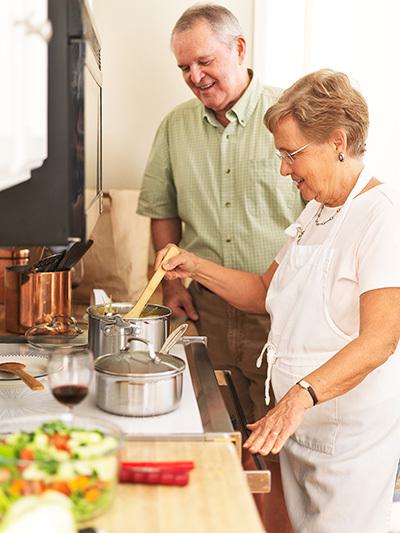The 4 Rules of Food Safety


The 4 Rules of Food Safety
Healthy eating should be a priority throughout our lives. As we age, it becomes an important factor in staying active and independent. Planning our meals with a focus on getting the right nutrients and maintaining a healthy weight will give our immune system a boost. Plan your meals to maximize nutrients by including lean protein, fruits and vegetables, whole grains, and low-fat dairy.

Seniors may become more susceptible to foodborne illnesses as their immune system weakens and stomach acid decreases, leaving bodies unable to fully fight the bacteria or virus causing the illness. For older adults age 65+, the results can be dangerous, even fatal.
If you have ever experienced a foodborne illness, commonly known as food poisoning, you know it is extremely unpleasant, to say the least. Nausea, vomiting, diarrhea, even body aches, fever and headaches combine to create quite the memorable experience. This takes a toll on the human body at any age, often resulting in dehydration and an overall feeling of weakness.
The good news is we can take action to prevent contracting foodborne illnesses by following 4 basic food safety rules:
- CLEAN. Washing your hands frequently with soap and warm water throughout the food preparation process. Be sure to wash them again if you sneeze or cough. Also keep all surfaces clean, including counters, cutting boards, and tables as well as utensils.
- SEPARATE. Be sure to keep raw and cooked foods separate. While in the refrigerator, raw fruits, vegetables and ready-to-eat foods should be kept away from raw meats. During prep, clean surfaces and wash your hands after handling raw foods.
- COOK. Always cook foods to their proper temperatures. A food thermometer
can ensure your food is cooked thoroughly all the way through. When preparing food in a microwave, make sure there aren't any cold spots that may contain bacteria. - CHILL. Refrigerate foods promptly. Follow the 2 Hour Rule: Don't allow perishable foods to sit on the counter for more than 2 hours. Do not thaw meat on the counter! Toss any food not stored at the appropriate temperature for more than 2 hours.
There are also some foods that seniors should avoid or consider carefully before eating:
- raw fish
- hot dogs and lunch meat unless heated to the appropriate temperature
- raw or unpasteurized milk or fruit and vegetable juices
- refrigerated pates or smoked fish
- raw or lightly cooked eggs
- raw meat or poultry
- raw sprouts
So be careful about storing, preparing and eating food. By cleaning, separating, cooking, and chilling you can help prevent contracting a foodborne illness… at any age!